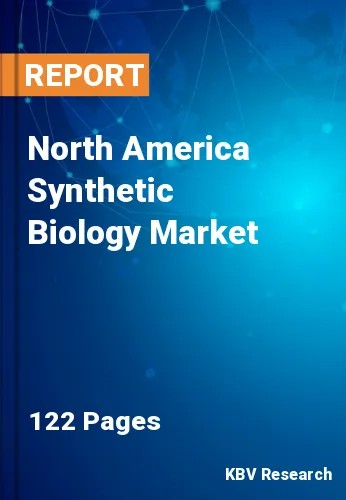The North America Synthetic Biology Market would witness market growth of 18% CAGR during the forecast period (2023-2030).
Synthetic biology is making notable contributions to the energy sector by producing biofuels. Engineered microorganisms and plants are designed to efficiently convert biomass into renewable fuels, aligning with global efforts to transition towards sustainable and clean energy sources. Synthetic biology enables the design and engineering of microorganisms to enhance their natural abilities to produce biofuels. Microorganisms like bacteria and yeast can be modified to efficiently convert sugars from biomass into biofuel molecules such as ethanol or advanced biofuels. Metabolic engineering, a key aspect of synthetic biology, allows scientists to optimize the metabolic pathways within microorganisms. This optimization enhances the efficiency of biofuel production by directing cellular resources toward synthesizing desired fuel molecules.
Moreover, synthetic biology has revolutionized drug discovery by enabling the engineering of microorganisms to produce therapeutic proteins and antibodies. This approach expedites the development of biopharmaceuticals and facilitates the creation of personalized medicines tailored to individual patient needs. The industrial sector utilizes synthetic biology to produce bio-based materials, chemicals, and enzymes. Engineered microorganisms serve as biofactories, converting renewable resources into valuable products in a more sustainable and eco-friendly manner.
Prominent American universities and research institutions, including Stanford, Harvard, UC Berkeley, and MIT, have been actively engaged in synthetic biology research. These institutions frequently collaborate with private and public entities to advance the discipline. Government agencies such as the National Institutes of Health (NIH), the National Science Foundation (NSF), and the Department of Energy (DOE) have contributed to synthetic biology research with financial resources and assistance. Thus, growing biofuel adoption and synthetic biology investment in North America can boost the demand in the regional synthetic biology market.
The US market dominated the North America Synthetic Biology Market by Country in 2022, and would continue to be a dominant market till 2030; thereby, achieving a market value of $13,358.6 million by 2030. The Canada market is experiencing a CAGR of 20.7% during (2023 - 2030). Additionally, The Mexico market would exhibit a CAGR of 19.6% during (2023 - 2030).
Free Valuable Insights: The Synthetic Biology Market is Predict to reach $46.7 Billion by 2030, at a CAGR of 18.7%
Based on End-use, the market is segmented into Biotechnology and Pharmaceutical Companies, Academic and Government Research Institutes, and Others. Based on Product, the market is segmented into Oligonucleotide/Oligo Pools and Synthetic DNA, Enzymes, Cloning Technologies Kits, Xeno-Nucleic Acids, and Chassis Organism. Based on Technology, the market is segmented into PCR Technology, NGS Technology, Genome Editing Technology, Bioprocessing Technology and Others. Based on countries, the market is segmented into U.S., Mexico, Canada, and Rest of North America.
By Application
By End-use
By Product
By Technology
By Country
Our team of dedicated experts can provide you with attractive expansion opportunities for your business.

